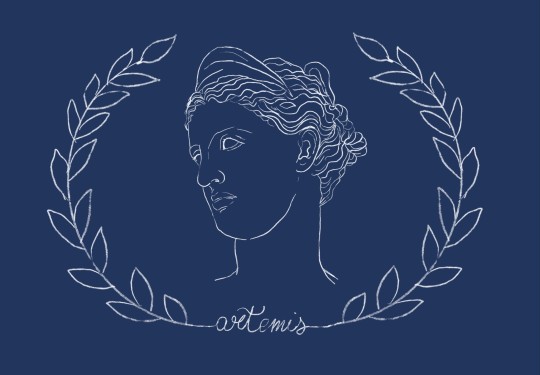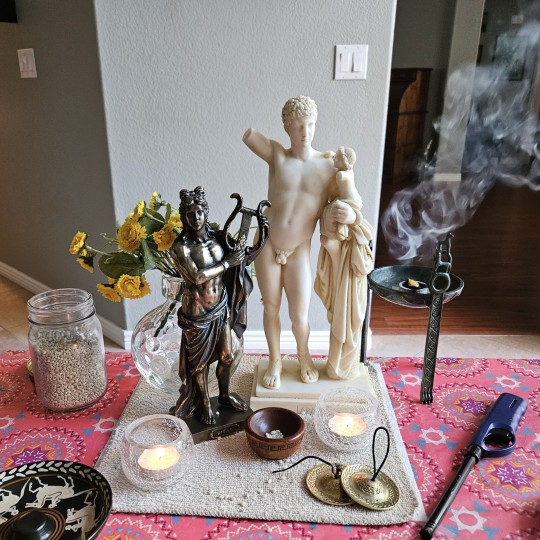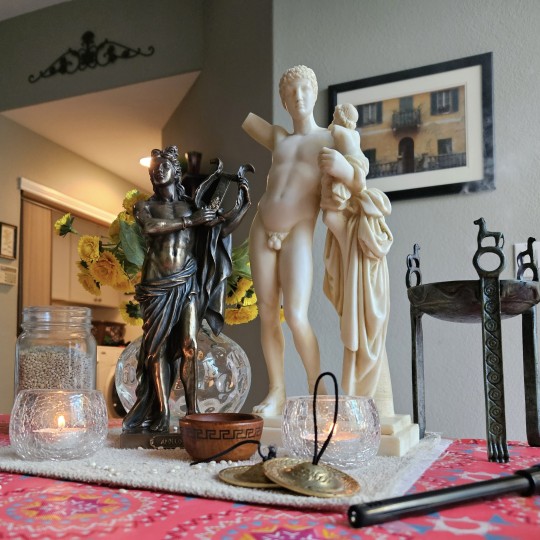#greek goddesses
Text
Yo can we talk about that time Persephone snatched someone to the Underworld because she stopped worshipping Artemis?

Artemis: There's a woman who stopped worshipping me, so I shoot her but let her live.
Persephone, who just dragged said woman to the Underworld: Don't worry bestie, I took care of the rest for you.
#persephone#artemis#greek mythology#well more like Roman mythology cuz they use Roman names#incorrect greek mythology quote#incorrect greek mythology#incorrect greek gods#greek goddesses#greek deities#the sister trio#gotta love your sis
29 notes
·
View notes
Text
The fact Hermes warned Odysseus about Circe and helped him to front her the right way but, before of all this, he also warned Circe about Odysseus' arrival and that he wasn't like others, doesn't get the attention it should.
1K notes
·
View notes
Text
"seducing" in this case doesn't need to be sexual - could also just be convincing you to enter a dramatic love affair or run away with them (also would love to hear your specific fantasies in the tags)
Obviously I can't fit everyone, so I'm sticking with the classics (sorry)
#greek gods#greek goddesses#greek god#I didn't include artemis cause she's often depicted as a young girl and that felt creepy#but I realize that's just me#greek goddess#percy jackson#percy jackon and the olympians#tumblr poll#tumblr polls#poll#polls#cottagecore-raccoon
854 notes
·
View notes
Text
Apollo: *crying* It was so hard! I couldn't take it man!
Artemis: *patting him on the back* Yeah life can be hard sometimes.
Apollo: Life?
#mod m#incorrect quotes#mythology memes#incorrect mythology#incorrect mythology quotes#greek mythology#greek mythology quotes#incorrect greek mythology#incorrect greek gods#greek gods#greek god#apollo#apollon#artemis and apollo#apollo and artemis#greek goddesses#greek goddess#artemis#artemis greek mythology#artemis deity#greek myths#ancient greek mythology#greek myth memes
492 notes
·
View notes
Text
Some people are very confused about why, in the myth of the Judgement of Paris, the three goddesses who fall for the Apple of Discord trick are Aphrodite, Hera and Athena. They usually understand why Aphrodite and Hera would fall for the trick of "the most beautiful" - one is the goddess of love, sexuality, romance and beauty ; the other is the queen of the goddesses. But when it comes to Athena, they tend to have a hard time seeing the goddess of wisdom, war, peace, intelligence and virginity get enroled into a "I'm more beautiful than you" petty feud.
... Except it is very much in line with her character, and yes, these three deities are in classical mythology the most vain of the goddesses.
Now, I will here use both Greek and Roman example mixed together because I do not have time to do a thorough split and explanation for everything - so rather let us take an overview of the goddesses' legends as a whole, throughout the centuries.
Aphrodite is vain, this is something that has been established regularly. She is a being of seduction and love, she is the most beautiful of the goddesses since birth and if it wasn't enough she had her husband create a magical belt for her that makes her attractive to anyone who sees her (a husband she cheated on with one of the worst gods of Greek mythology just because said husband was ugly and the other god was hot. Hated but hot.)
One version of Echo's legend has Pan's unrequired love for her caused by Aphrodite as a punishment for not giving her the "most beautiful" award (and turned the other contestant who won into a shark). Aphrodite persecuted Psyche because she was said to be more beautiful than her. Myrrha was cursed by Aphrodite to fall in love with her father because her mother claimed she was more beautiful than the goddess. And there's a lot of other tales like that - so it is well established that not only is Aphrodite the most beautiful goddess, she makes all of her efforts to stay that way and will be VERY angry if anyone refuses her this title (sounds a bit insecure if you ask me but what do I know?)
If we go to Hera, we have again a certain case of pride and a status to be held. Hera is renowned for her beautiful eyes (the famous "cow-eyes" which no, are not an insult, but where an Ancient Greek compliment, because cow-eyes were deemed to be beautiful), and she is the queen of the gods, Zeus' eternal queen, THE first goddess among them all. That's a certain status to hold - and since she is known to have a bad temper, this comes of as a form of vanity and jealousy. The fact Herakles was named Herakles, "the glory of Hera", was precisely in an attempt to appease the goddess' wrath by appealing to her with flattery (turns out it didn't work). Remember: when Zeus had children of his own, without female help, such as Athena (or rather when it looked like he produced Athena on his own), Hera got pissed off because she saw this as a personal offense and tried to have a child of her own without Zeus just to prove him she could do it too (and the result was always disastrous, ranging from Hephaistos to FRIGGIN TYPHON).
This also ties into the whole idea of Hera persecuting Zeus' lovers and "bastards" out of jealousy. Note that she does not persecute ALL of Zeus' lovers, nor does she persecutes all of his extra-marital children... She always picks up those that Zeus seems to favor. That was why it all started with Herakles: Zeus was boasting about how he was going to shower his son with great gifts and a glorious destiny and all that, and Hera wouldn't have that. But she did not persecute Herakles' mother in any way... Just the son that Zeus clearly favoritized. And it becomes VERY obvious Hera's jealousy is not just related to a case of "cheating" in the case of Leto. Hera persecuted Leto for bearing Zeus' children and being deemed more beautiful than her by Zeus... When the myths are clear that Leto was Zeus companion (and possible wife) BEFORE Hera married Zeus. Before this whole story became another one of Zeus' cheating cases, this was a tale of Hera, unmarried to Zeus yet, simply being jealous of Leto being deemed more beautiful than her.
So this was all quite well established... But what about Athena, then, you ask?
Athena is also vain. I am sorry to announce it to you, but all the goddesses of Ancient Greeks have a flaw in myths (not in religion though, in religion all the goddesses are perfect and benevolent, but in legends and texts they are human-like with flaws and vices), and Athena's personal vice is vanity. The whole Arachne myth has sometimes been interpreted as a manifestation of Athena's personal pettiness, as in she cannot stand that someone is better than her at weaving. (It is a bit complicated since as I said before the legend of Arachne is purely Roman not Greek but I also told you I was going to mix Roman and Greek today so you have been warned). Even outside of the legend of Arachne, there is the legend of the flute - how Athena invented the first flute, but then cast it away and cursed it because when she played it, she looked ugly and people mocked her. This is probably the most famous legend about her vanity. And as I posted a long time ago - while this version of Medusa's legend was mostly lost to time because we lack the text, and it was preserved in scholia, we know that by Classical Greece the legend of Athena turning Medusa into a monster was quite popular... but it was all about Medusa being more beautiful than Athena, hence her being turned into a monster.
There's also a legend of a Meropis turned into an owl for mocking Athena's eye-color...
Anyway! Conclusion, it makes sense in the wider scope of Greco-Roman mythology to have these three goddesses be the one to fall for Eris' scheme, because they are the three most vain Olympian goddesses. Now it would have been weird if the candidates would have been, I don't know... Demeter or Hestia. These goddesses are not renowned for any vanity. But Athena? Yeah, makes sense.
EDIT: @teamrocketsfatknockers made a quite important point in a reblog and so I will add a point to my article.
I will insist that all I present to you above is from an "in-universe" point of view and a literal reading of the story. We are here talking of "humanized characterization" for the goddesses, and from a purely narrative, fictional point of view. That was my angle of attack: Why would Athena be considered "vain" in-story when we typically associate an asexual virgin who hates romance and is more into war and high-intellects with someone not much into superficiality or appearances.
But as I repeatedly said before, each myth has at least three levels of interpretation and three meaning warped in one. A religious meaning (though the one in the Judgement of Paris is... unknown to me so far), a literal meaning (as in we have a story, with characters, and this is a fiction) and a metaphorical or philosophical meaning. So I need to highlight that the myth of the Judgement of Paris can be read in a philosophical way as such. Why are these three goddesses searching for the Golden Apple aimed at the "fairest of them all"? Because all three of them embody the most attractive and seductive concepts a Greek man can ever hope for ; they are all three the ideals of Ancient Greek mindset and society. As such Paris' choice and the goddess' quarrels isn't about just satisfying the petty vanity of superficial divas anymore - it becomes a deep debate about which ideal, which dream is the most desirable for a Greek hero, and by extension for a Greek man. Hera is royalty, supremacy, political power and domination ; Athena is peace and wisdom, heroism and cleverness ; Aphrodite is romance, love, beauty and sexuality. And this all reflects within their gifts to Paris - which are in fact extension of what the goddesses themselves embody and represent.
You could sum it up as: Do you want to be a king, a hero or a lover? What would reward you most in life, a crown, a sword or a wife? What allures to you more, power, glory or romance?
Again, that's the beauty of the Greeks myths - and of all myths in the world. They depict simultaneously the gods as the pettiest more vicious selfish and flawed persons you ever met, basically warped caricatures of humanity... and as deep, profound, essential principles of human nature and human society, whose every interaction with mortals causes philosophical debates, ideological questioning and existential crisis.
200 notes
·
View notes
Text

Pretty much every figure in Greek myth has done something making them a terrible person or boarder line questionable at best.
#greek myth#greek mythology#tagamemnon#greek gods#greek goddesses#epic the musical#illiad#odyssey#percy jackson#pjo#greek myth memes#pjo memes#greek quotes
154 notes
·
View notes
Text

Greek Deities’ Fancast in Percy Jackson and the Olympians
Ross Lynch as Apollo
#rcfancast#percy jackson and the olympians#pjo#pjo tv show#pjo tv series#disney +#fancast#greek gods#greek goddesses#percy jackson#rick riordan#apollo#ross lynch#apollo pjo#apollo is your blonde beach boy#something i think ross can play easily
215 notes
·
View notes
Photo

Hades and Persephone, current era 🖤
#hades and persephone#hades#persephone#greek mythology#greek gods#greek goddesses#greek myths#valentine's day#god of the underworld#fantasy illustration#height difference#hades x persephone
1K notes
·
View notes
Text

Hera in Kanathos
There is this really weird myth that Hera goes to this spring called Kanathos every year to restore her virginity. Decided to reinterpret it as her going to the spring to get some much needed relaxation and privacy.
#greek mythology#ancient greek mythology#greek pantheon#hera#greek goddess#hera goddess#hera deity#hera greek mythology#greek goddesses#greek myths#greek mythology art#Kanathos#peacock#white peacock
176 notes
·
View notes
Text
Artemis: I'm worried about you.
Apollo: *dunks Oreo in whiskey* Why?
#mythology memes#incorrect quotes#incorrect mythology#incorrect mythology quotes#greek mythology#incorrect greek mythology#greek myths#incorrect greek god quotes#incorrect greek gods#greek gods#greek goddesses#greek god#apollo#apollo greek mythology#apollo greek god#apollon#apollo deity#greek goddess#artemis#artemis greek mythology#artemis deity#apollo and artemis#artemis and apollo#ancient greek mythology#classical mythology
363 notes
·
View notes
Text
Headcanon time!
There weren't many texts recorded about Hyacinthus coming back to life or being worshipped outside of Sparta is because the Underworld deities didn't want more humans to know resurrection was an option.
Persephone: We're doing something illegal for you and your boyfriend, so you better keep it lowkey.
Apollo: Got it.
Apollo, later: *creates a nationwide festival to celebrate Hyacinthus' resurrection*
#hyacinthus#apollo#persephone#greek mythology#headcanons#incorrect greek mythology#incorrect greek gods#incorrect greek mythology quote#greek gods#greek goddesses#greek deity#hyacinthia festival
172 notes
·
View notes
Text
Hades: I’m still trying to figure out why you like me.
Persephone: Because you’re sweet and funny.
Hades: Well Thanatos says I’m mean and grumpy, so one of you is lying.
#greek mythology#greek gods#greek myths#myths#gods#mythology#hades#persephone#hades and persephone#greek goddesses#lore olympus#percy jackson#pjo#incorrect greek gods#incorrect greek mythology quotes#incorrect greek mythology#incorrect greek myths#incorrect lore olympus quotes#incorrect percy jackson quotes#incorrect mythology quotes
3K notes
·
View notes
Text


Artemis and Ares🌙⚔️
Who should I draw next??😊
#artemis#artemis goddess#greek mythology#greek goddess#greek goddesses#Ares#Ares god#Ares greek god#greek god#greek gods
373 notes
·
View notes
Text
Hera: Today we're making Fuck-Off pie.
Hera: You're gonna need one cup of No-One-Cares, a dash of Kiss-My-Ass, add some Fuck-You's, and a pinch of Blow-Me.
Hera: You're gonna wanna stir it all together, and shove it up your ass.
#mod m#greek mythology#incorrect greek mythology#incorrect greek myths#incorrect mythology#incorrect mythology quotes#incorrect greek gods#greek gods#greek goddesses#greek goddess#hera#hera goddess#hera greek mythology#incorrect greek god quotes#incorrect greek quotes#greek myths#greek myth
232 notes
·
View notes
Text
I want to briefly adress another BIG misconception about Greek gods that has (quite recently) been going on around the Internet. And it is again part due to the Percy Jackson TV show. I insist on the "TV show", because as we now know, the TV show made some changes to the book's original plotline when it came to the gods interacting with their children (like Athena's move with Echidna *cough cough*), and as a result here is what I have been hearing here and there.
"Yeah, well the Greek gods were all assholes, right, but what PJ REALLY got right was that they were especially assholes to their own children and the worst abusive parents ever".
... No?
In fact this is almost a counter-interpretation of Greek mythology, because in Greek myths and legends, the whole point was that, when a god was being an "asshole" as you say, they were an asshole to everybody... except their children. One of the reasons the Greek gods can look "bad" by modern standards is precisely because they had an habit of favorizing their own children, and taking care about them more than about other beings.
The most famous of these myths is of course Demeter's immense love and hyper-protection of Persephone - just look at the trials she went through to find her back after she disappeared.
Another famous example is how Poseidon turned on Odysseus and plagued him with curses and monsters for blinding his son - Polyphemus the cyclop (and the whole point here is that Poseidon favorized his son, despite his son being the actual criminal and monster in the case)
Ares, who was not one of the best gods, still went on an avenging mode every time his children were attacked, from the dragon slain by Cadmos to the rape of Alcippe.
There's how Apollo went berserk after the death of Asclepios. There's how Herakles had planned to be favorized by Fate since his birth thanks to Zeus, and how the entire reason Zeus inflicted on his wife the atrocious torture of hanging chained up by the sky was because he had enough of her constantly tormenting Herakles in the worst ways possible. Even Athena ended up taking care of Erichthonius as her own child despite her not being his true mother - showing that even the virgin, sexless, childless goddess has a mothering side to her.
It all goes back to Gaia, and how she keeps turning against Zeus for each time vanquishing her children - from the Titans, to the Giants, to Typhon - despite these children being again, bad news and even hurting Gaia herself. Another example of "primordial motherhood": Nyx shelters Hypnos from Zeus' wrath in the Iliad, and not even Zeus would dare anger such an elderly mother-goddess. And if we push beyond the boundaries of Greek mythology and into the very late Roman literature, we see this trend continues with Aphrodite's smothering-mothering of Eros during the Psyche legend.
A good lot of conflicts and feuds and problems in Greek mythology was precisely due to how much the gods loved their children, and how protective they were of them - with the problem that the god had the tendency to be blind to whether their children were good or evil, victims or criminals.
This is why, for example, Zeus and Hera's relationships to their children were especially important and unique in Greek myths, in the light of this god's tendency to favorize and spoil and protect their own children.
On Hera's case, her action of, for example, throwing Hephaistos into the sea at birth just because he is "ugly" is meant to come off as massively shocking. Remember that in a good bunch of Greek myths, Hera had a negative, evil, dangerous side to her, that popped up in various ways - from her jealous, vain, angry personality to how in some versions she literaly gave birth to Typhon... Unlike Zeus, who was the "ultimate father", Hera wasn't (in myths, I insist) seen as a postive mother, and was more of a mother-of-monsters avatar (after all, she did command a lot of Greek monsters), or an anti-mother (she was the one who prevented Leto from giving birth, a powerful symbol).
On the other side, Zeus was also seen regularly punishing or being very harsh to his children, but there was the secret to his character: Zeus had to act both as a father, and as a king. He embodied the all loving ancestor and the all powerful father, but he also had to act as the embodiment of law and of justice, and those two aspects of his personality clashed a lot. We see him punish his divine children regularly, but almost always because his role as the enforcer of the law primed over his role as a father - for example when he wanted to throw Apollo into Tartarus because he had caused a Cyclop genocide out of anger. But he still had this same "over-parenting" side as the other gods. Again, Herakles was one of his favorite children and he tried to arrange everything so that he could have the greatest life ever - but his official side as the "political" and "civilization" god caught up to him when Hera tricked him into swearing away the gifts he had intended for Herakles. Despite Zeus' immense love for his son, his oath and the law he embodies took over and prevented him from sheltering Herakles from Hera's hatred. The most revealing case of this "father vs king" aspect of Zeus' personality comes from the Iliad: it is the death of Saperdon.
When Zeus looks upon the Trojan War and sees that his son will soon die, he is very heavily tempted from interfering. He explicitely wishes to save him, and to change the scales of fate to avoid his impending death (because remember in the Iliad Zeus was still the god of fate who literaly weighed humans' destinities in his scale). That's his "father" side showing up. But then Hera, who is by his side, who is his queen and thus his "political" side, reminds him of his duty as a king and of his role as ultimate judge of the world and ruler of the gods. She points out he would break the very own law he imposed of not interfering with the mortal conflict. She reminds him that, as the setter of examples, if he saved Sarpedon, he would create a precedent and other gods could also start saving their own children from the war. She reminds him that he has a role as the god of law and fate, and that he can't allow his personal feelings to interfere in the matter, else he would be unfair and unjust. And thus, Zeus resignates himself to let his son die before his eyes - but he still shows his immense love for him by both sending a shower of blood as a sign of his grief, and then ordering Apollo, Hypnos and Thanatos in person to carry Sarpedon's corpse away (predating future legends about great kings and heroes taken into the afterlife by supernatural figures, like Arthur collected by Morgan and the ladies of Avalon).
In conclusion: having the gods act as if they were all bad, abusive, absent parents not getting involved in their children's life or not caring about them is actually going against what the mythology originally said in terms of characterization. The untold rule of Greek mythology was that, if gods were bad parents, it would be because they were too loving, too protective, too smothering, too spoiling, interfering too much. Not the other way around - unless you were Hera, of course. Meanwhile, having the gods act as "assholes" and bullies towards OTHER GODS' children, now that would be accurate to Greek mythology (this is the very basis of Hera's cycle of legends as a persecuting goddess). But the gods usually stuck by the side of their own children - a bit like how in a school's football or soccer game the parents end up fighting each other because of what their children did or did not do in the game.
394 notes
·
View notes
Text


Tending the dining room altar. :)
#Meleagros’s#Hermes#Hermes deity#Apollo#Apollo deity#The Mousai#The Muses#Greek gods#Greek god#Greek goddesses#Greek goddess#Hellenic polytheism#Hellenic polytheist#Hellenic paganism#Hellenic pagan#Hellenic reconstructionism#Hellenic reconstructionist#Hellenic revivalism#Hellenic revivalist#Helpol
399 notes
·
View notes